
 |
||
In this Issue |
|||||||
| • Meeting with Chief Judge | • NYS Bar Association Diversity | ||||||
| • Barry Clarke Interview |
• Commission Highlight | ||||||
| • Court Officers Graduation | • Podcast | ||||||
| • Jewel McCollin Retirement | |||||||
Commission Meets with The Chief Judge |
||
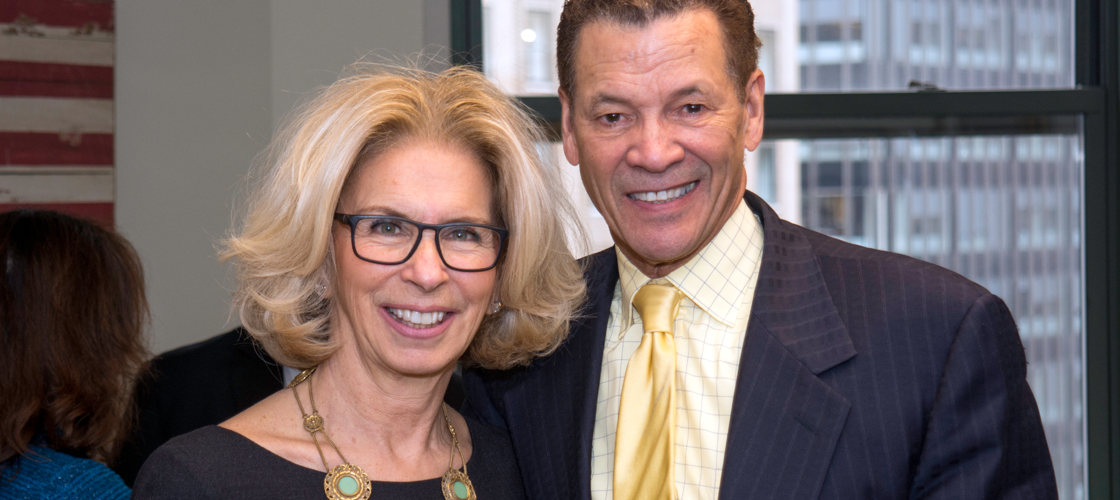 |
||
Hon. Janet DiFiore, Chief Judge, Court of Appeals and Hon. Richard B. Lowe III, Chair of the Franklin H. Williams Judicial Commission |
||
|
On March 15, 2016, the Franklin H. Williams Judicial Commission met with Chief Judge Janet DiFiore and Chief Administrative Judge Lawrence Marks. The meeting was an opportunity for the Commission to welcome her as the new Chief Judge of the New York State Courts and is part of our standing annual meeting with the Chief Judge. At the meeting we reviewed the Commission’s recent accomplishments and shared our goals and mission for 2016 - 2017. The Commission was encouraged with Judge DiFiore’s commitment to our mission and look forward to continuing to advance diversity, justice and equality under her leadership. |
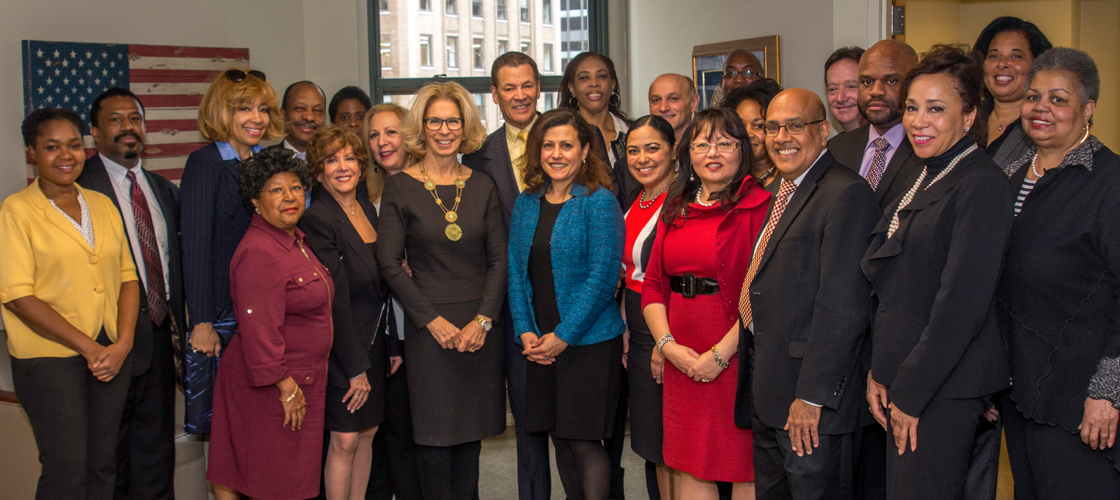 |
||
Commission meeting with Chief Judge Janet DiFiore and Chief Administrative Judge Lawrence Marks: L to R, Karlene Dennis, Hon. Richard Rivera, Nadine Johnson, Esq., Hon. yvonne lewis, Hon. George B. Daniels, Hon. Barbara R. Kapnick, Linda Dunlap-Miller, Lenore Kramer, Esq., Hon. Janet DiFiore (Chief Judge), Hon. Richard B. Lowe III (chair), Sandra Rivera, Esq., Hon. Troy K. Webber, Hon. Joanne D. Quiñones, Hon. Lawrence Marks (Chief Administrative Judge), Hon. Doris Ling-Cohan, Hon. Craig D. Hannah, Lenore B. Foote, Esq., Hon. Eduardo Padro, Paul Kenny, Esq., Lieutenant Clemont Mack, Hon. Kathy Davidson, Adrienne Williams, Esq., Joyce Y. Hartsfield |
||
Serving the Court Community by Example |
||
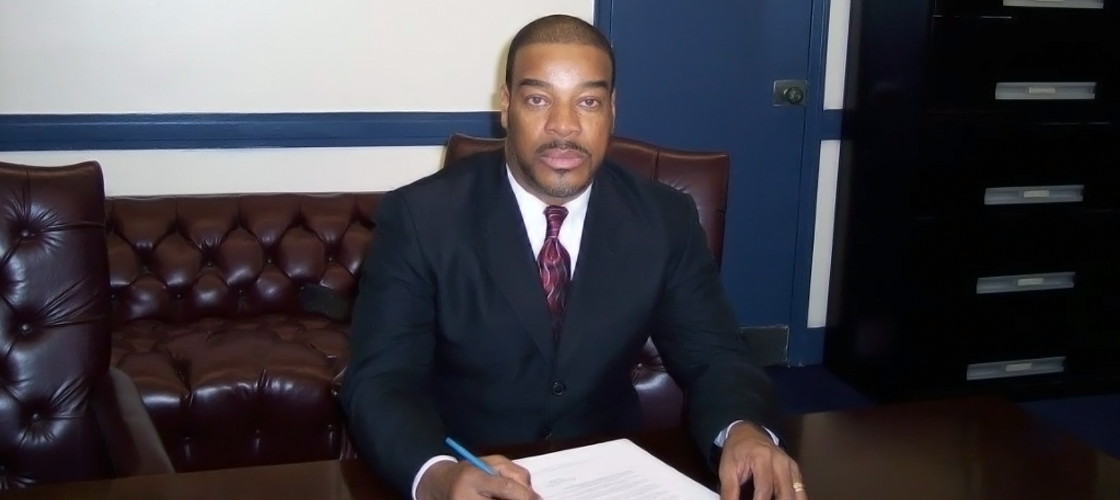 |
||
Barry Clarke, Esq. |
||
|
Barry Clarke, Esq. is Chief of Operations for the New York State Courts. Mr. Clarke has a stellar history of service in the courts that has brought him career achievement. He shares insight into his duties as the Chief of Operations, his pathway to achievement and the traits that assisted him in a successful career. 1. What motivated you to study law? I was extremely fortunate to take advantage of numerous promotional opportunities and have subsequently enjoyed a very satisfying career in the court system. I was taught by my wonderful parents at a very young age that whatever you do, strive to learn as much as you can and do your very best. I had the great fortune of starting my career in the court system as a court officer and working my way up the proverbial ladder - step by step. My efforts to be successful in the court system coincided with my passion for the law. In studying—with the help of the Tribune Society Inc. study classes—for three promotional exams Senior Court Clerk, Associate Court Clerk and Principal Court Clerk, I found that the Civil Practice Law Rules (CPLR), Criminal Procedure Law (CPL), Penal Law (PL) and Family Court Act (FCA) proved challenging to read but surprisingly to me - comprehensible. Along my professional journey and blessed with working in several courts, I met many court employees and judicial staff who willingly served as mentors and encouraged me to excel. For example and with respect to my initial motivation to study law, Judge Edward J. Greefield, to whom I was assigned during my court officer tenure basically took me under his wings. He graciously and patiently took the time to explain his rulings and determinations to me and answer my many questions. Because of those numerous and wonderful conversations, I became fascinated with the law, specifically controversial law cases and legal arguments. That fascination increased exponentially when I was promoted to clerk and was assigned to the Ex Parte Office at 60 Centre Street. While in that office the learned court clerks of various grades shared their expertise and knowledge and I enjoyed the opportunity to read attorneys’ order to show causes, motions, etc. After promoting and moving on to Civil Court, with the encouragement and support of my colleagues, and my enthusiasm to learn, I enrolled in Law School (evenings) to strengthen my understanding of statutes and rules and increase my legal knowledge. 2. What are your principle duties as Chief of Operations of the New York State Unified Court system? I assist the Chief Administrative Judge and Executive Director of the Statewide Court System in overseeing the day-to-day operation of the Courts. Responsible for providing support functions to the courts in furtherance of policies and procedures set by the Executive Office. I am responsible for the development of court policy and the management and planning of projects and initiatives. I oversee the Divisions of Administrative Services, Communications, Court Research and Jury Services, Facilities Planning, Financial Management, Human Resources, Professional and Court Services, Public Affairs, Pubic Safety, and Technology. I also provide managerial analysis of complex issues and make policy recommendations. I work closely with court administrators and non-court agencies to resolve administrative challenges and implement initiatives. 3. What qualities or traits do you believe is necessary to be a successful employee within the courts? I believe very simply that one should be honest, respectful, polite, and ethical. A self-motivated disciplined hard worker who is willing to be a team player and give credit where credit is due will find much reward and success in the court system. 4. Was there a person or organization that positively impacted you while growing up and how did the person or organization impact you? I was very athletic in my youth and played on numerous football, basketball and baseball teams. I have had many coaches including my parents who have instilled in me the need to work effectively with others. Learning that in all aspects of life, in order to win you must be willing to play as a team, help each other, and share accolades, helped me to understand the importance of being an effective team player. 5. Why is diversity important in the courts? It is well established that diversity promotes public trust and confidence in the court system. Diversity presents opportunities to improve the efficiency and success of the Courts by respecting and utilizing the talents of all individuals. To a majority of the general public, they find the legal process difficult, stressful and intimidating. Diversity of the workforce and the Judiciary aids the Court in reducing those anxieties. It is important that the Court System’s workforce mirrors the community it serves, which enhances customer service and is essential to promoting the rule of law. Mr. Clarke received his Bachelor of Science Degree in Legal Studies from John Jay College and his Juris Doctorate from New York Law School. In 1986, he began his career in the courts as a Senior Court Officer. In 1987, he served as a Senior Court Clerk in New York Supreme Court, Civil Term, and then as an Associate Court Clerk in New York City Civil Court Kings County. In 1993, he served as Principal Court Clerk in New York City Civil Court, Queens County. From 1995 -2004, he was the Deputy Clerk in New York City Civil Court, New York County. In 2004, he served as Special Counsel to the Executive Office for the Office of Court Administration. From June 2008 to present and in addition to his current position, he serves as Chief Clerk in New York County Supreme Court, Criminal Matters. |
|||
Chief Judge Janet DiFiore administers oath to the graduates of the court officers acadedmy |
||
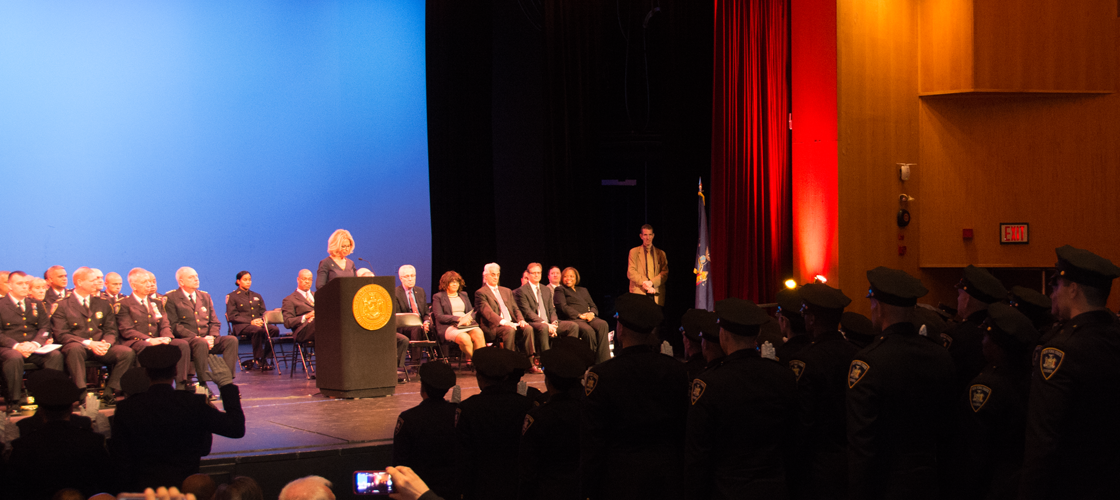 |
||
Chief Judge Janet DiFiore administers oath of office to the June 2016 Court Officers Graduation Class. |
||
|
The largest Court Officer's class in the history of the New York Court System graduated on June 10, 2016. The ceremony was held at the Borough of Manhattan Community College on a gorgeous sunny day. The class of 152 Court Officers were Determined, Dynamic and Diverse. |
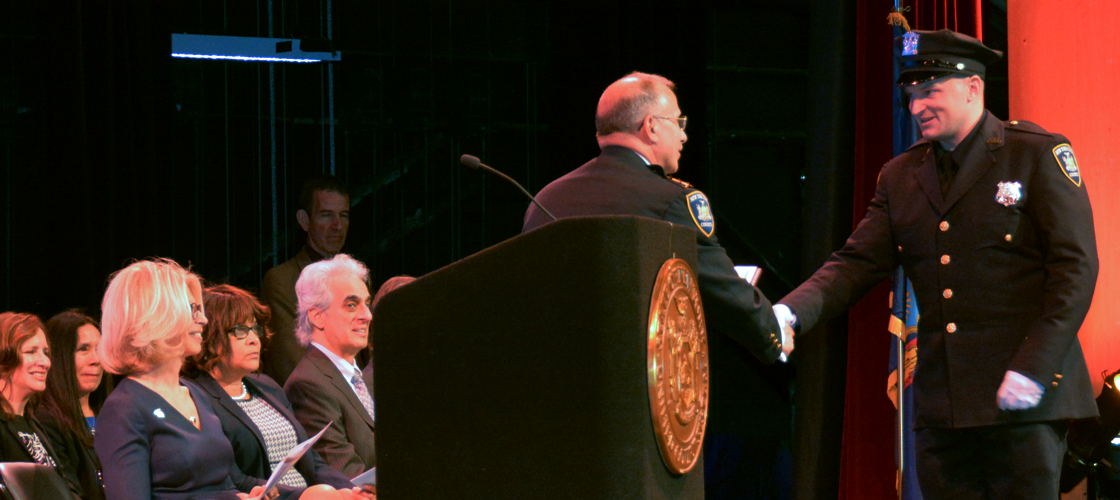 |
||
Chief Joseph Baccellieri Jr. presents the Firearms Award to Court Officer Eric Thompson |
||
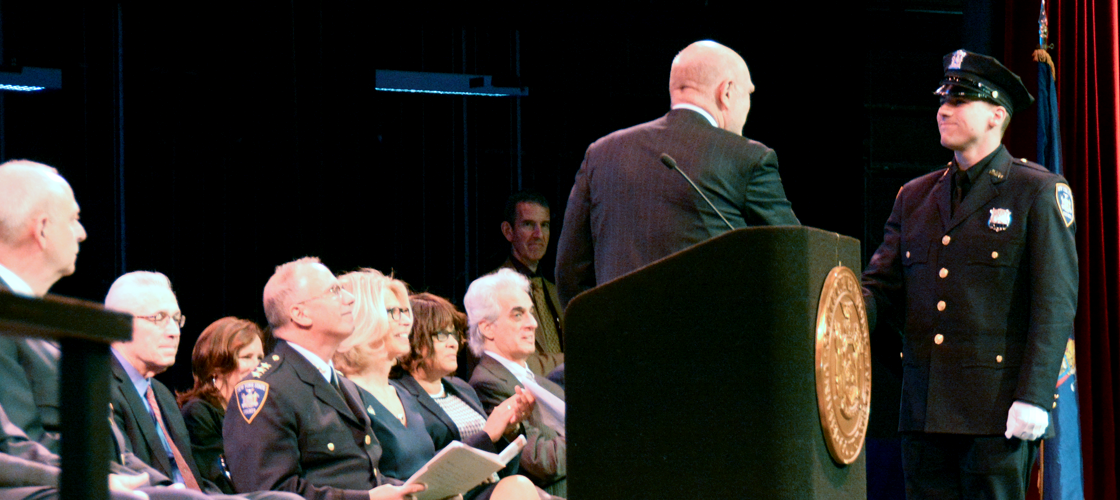 |
||
Ronald P. Younkins presents the Academic Award to Court Officer Jonathan Jividen |
||
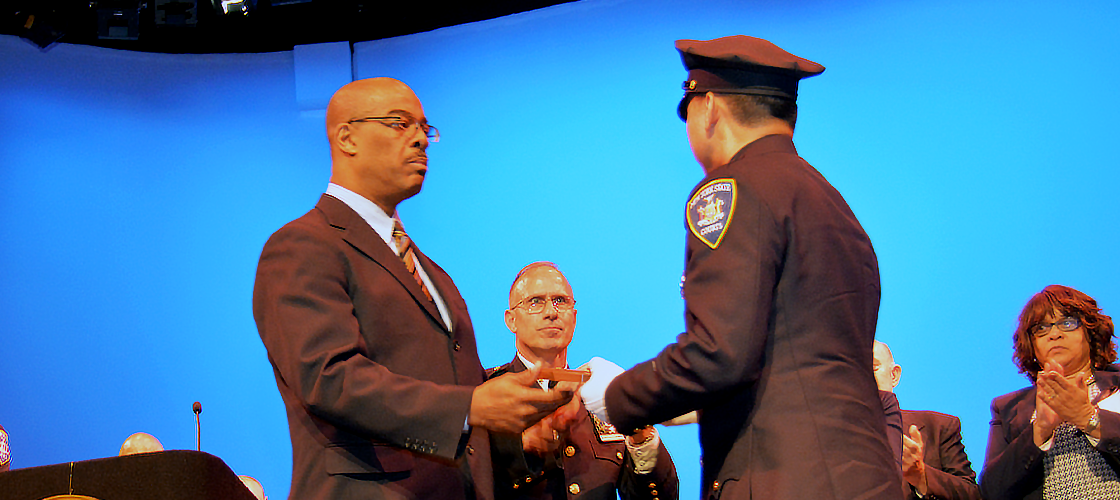 |
||
Barry R. Clarke presents the W.H. Thompson Leadership Award to Stephen Chan |
||
 |
||
Academy Staff |
||
Chief Jewel McCollin Retires from Service |
||
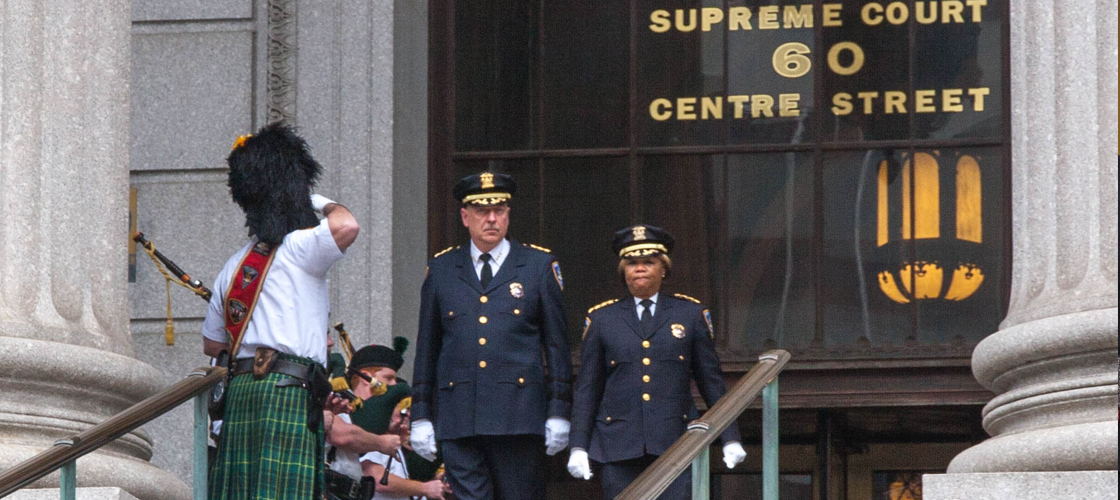 |
||
First Deputy Chief of Public Safety Howard Metzdorff escorts Chief Jewel McCollin during her walkout at 60 Centre Street, N.Y., N.Y. |
||
|
On May 5, 2016, Chief Jewel McCollin of the Department of Public Safety participated in a ceremonial walk-out at 60 Centre Street to commemorate her retirement from 37 years of service with the New York State Unified Court System. Chief McCollin was greeted with enthusiastic applause as she walked down the steps of the courthouse as over 250 officers stood at attention acknowledging her superb career. At the bottom of the stairs, colleagues greeted her and thanked her for her commitment and leadership. Chief McCollin is the first African American female to hold this position. We salute Chief McCollin and wish her much continued success in her retirement. |
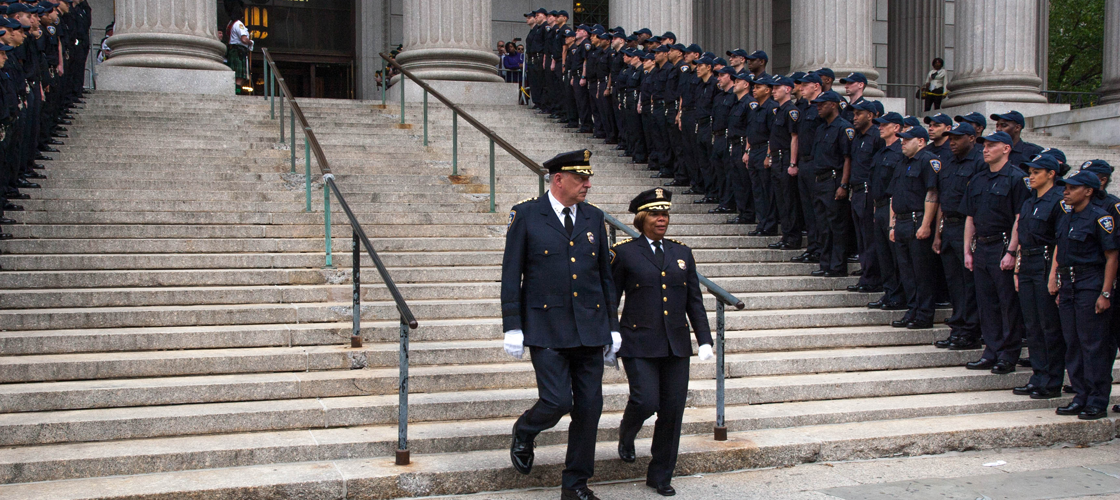 |
||
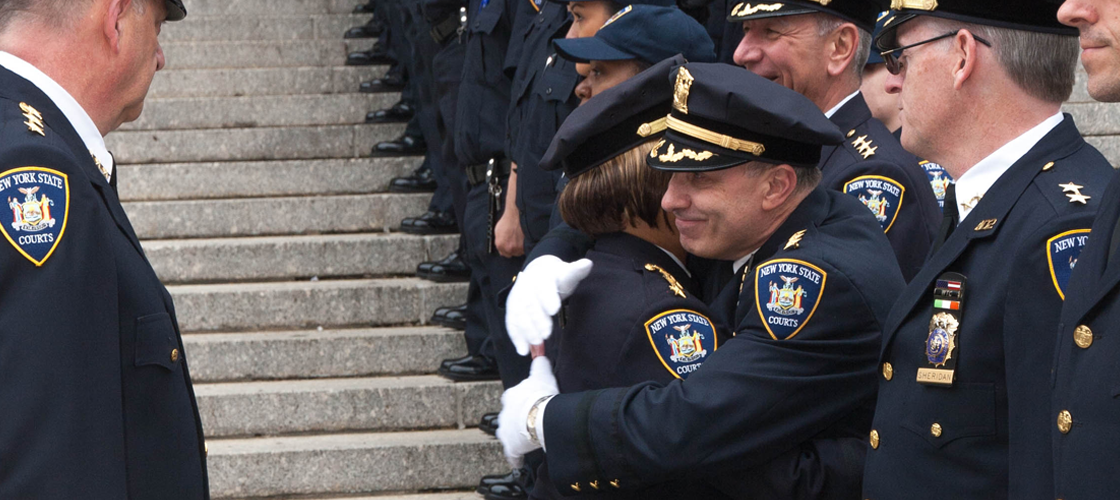 |
||
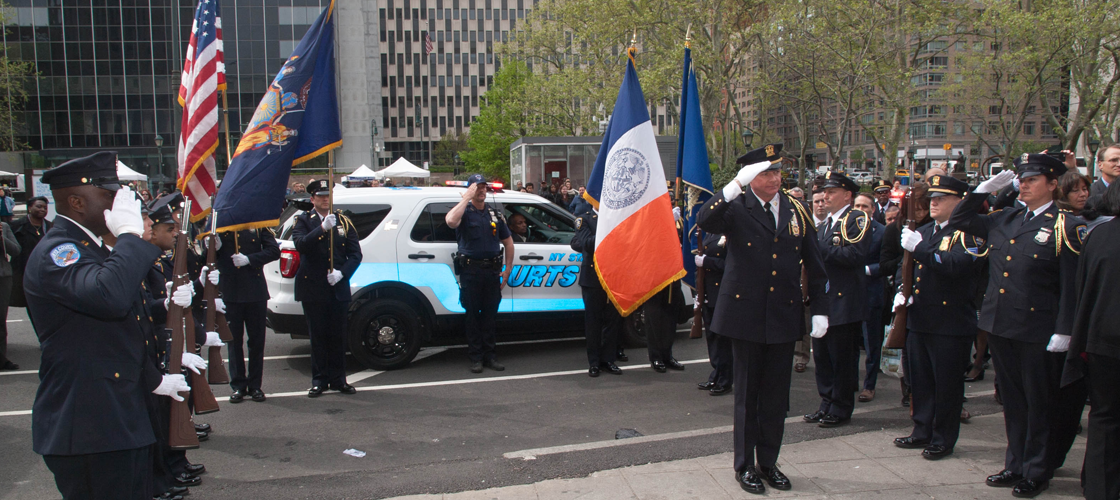 |
||
|
On April 20, 2016, the New York State Bar Association Committee on Diversity and Inclusion’s Judicial Diversity Subcommittee and the NYSBA Judicial Section presented a seminar entitled, “An Examination of Judicial Diversity in New York State”. The program occurred at Pace University Law School in White Plains, New York. The program considered the advantages of a diverse judiciary and provided useful advice when aspiring to all levels of the judiciary within the court system. The following topics were discussed, “The Impact and Importance of Diversity in the Judiciary; The Different Paths to the Judiciary; Navigating the Judicial Selection Process (Appointive and Elective); and Understanding the Challenges and Overcoming Barriers.” The moderator of the program was Elena Goldberg Velazquez, Esq. from the Appellate Division Law Department of the First Judicial Department. The panelists included Hon. Alan D. Scheinkman, Administrative Judge for the Ninth Judicial District, Hon. Kathie Davidson, Supervising Judge for 9th Judicial District Family Courts, Hon. Walter Rivera, Greenburgh Town Justice, Hon. Gretchen Walsh, Supreme Court Judge , 9th Judicial District, Guy Parisi, Esq., and Hon. Javier Vargas, Family Court, New York County. The judges reviewed their path to the bench. Judge Davidson, a member of the Franklin H. Williams Judicial Commission had served as Deputy County Attorney in the Westchester County Law Department prior to election to the bench in Westchester County Family Court. Judge Scheinkman and Judge Rivera both expressed how they began their careers as law clerks at the New York State Court of Appeals. Judge Walsh began as a law secretary to Judge Schienkman and recalled the highlights of her experience and skills that prepared her for a career as a jurist. Mr. Parisi spoke about his legislative and election law experience and the importance of complying with the nuances and variances of the law. Ms. Goldberg Valezquez Esq. elaborated on the ethical consideration of the nomination process for the Supreme Court. The event was well attended and provided a roadmap for those who aspire to the judiciary especially persons of color who may not have access to information from first- hand experience. The Commission would like to thank Mark Wilson, Manager of Bar Services and Staff Liaison to the Committee on Diversity and Inclusion for his assistance in the preparation of the program. |
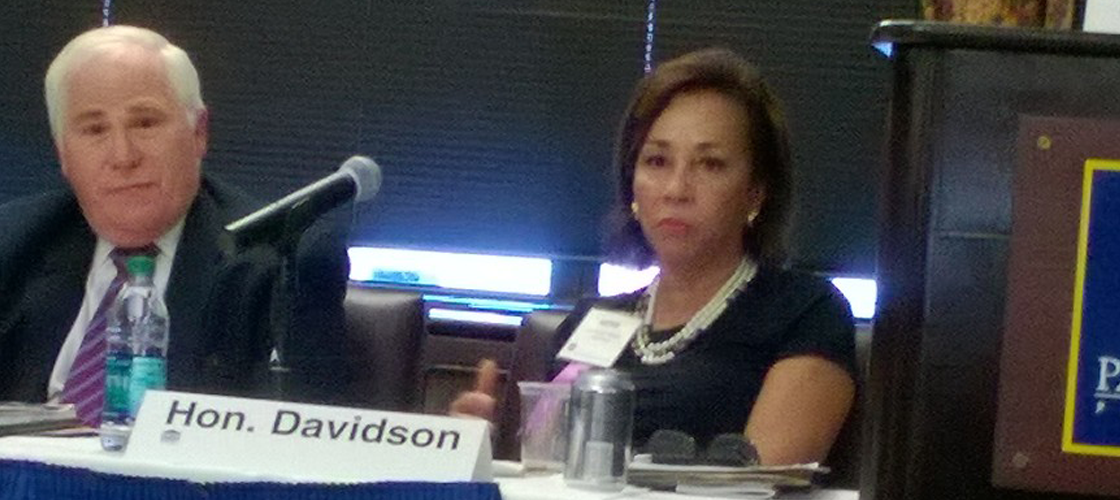 |
||
Hon. Alan Scheinkman and Hon. Kathie Davidson |
||
Commission Member Highlight |
||
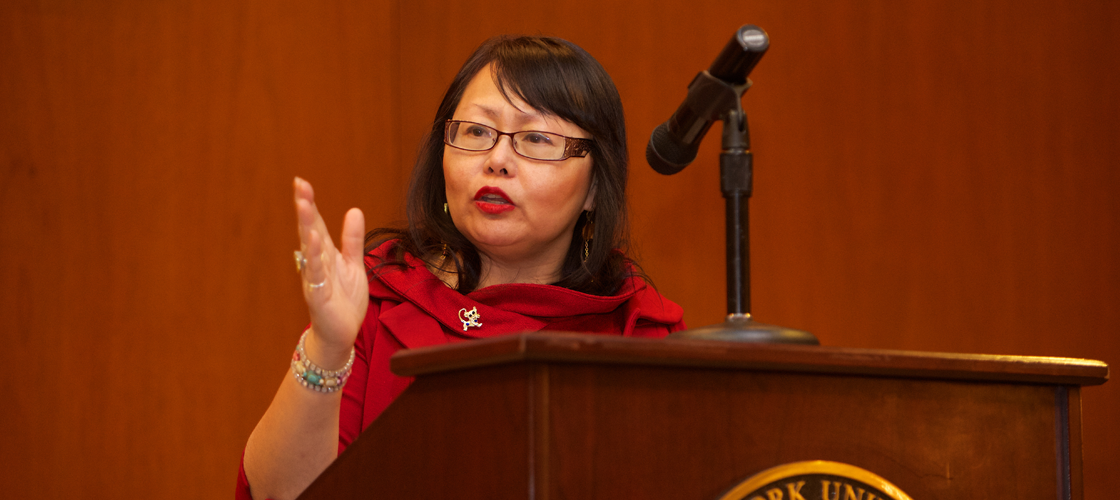 |
||
Justice Doris Ling-Cohan |
||
|
The Commission would like to congratulate Commission member Hon. Doris Ling-Cohan for being a featured alumna at New York University School of Law. Judge Ling-Cohan serves as an Associate Justice of the Appellate Term, First Department. To read more about her passion for justice and equal rights in the court and the community, please visit the link at: http://www.law.nyu.edu/alumni/almo/pastalmos/2015-16almos/doris-ling-cohan |
|||
Follow us on Twitter & Visit Our Podcasts |
||
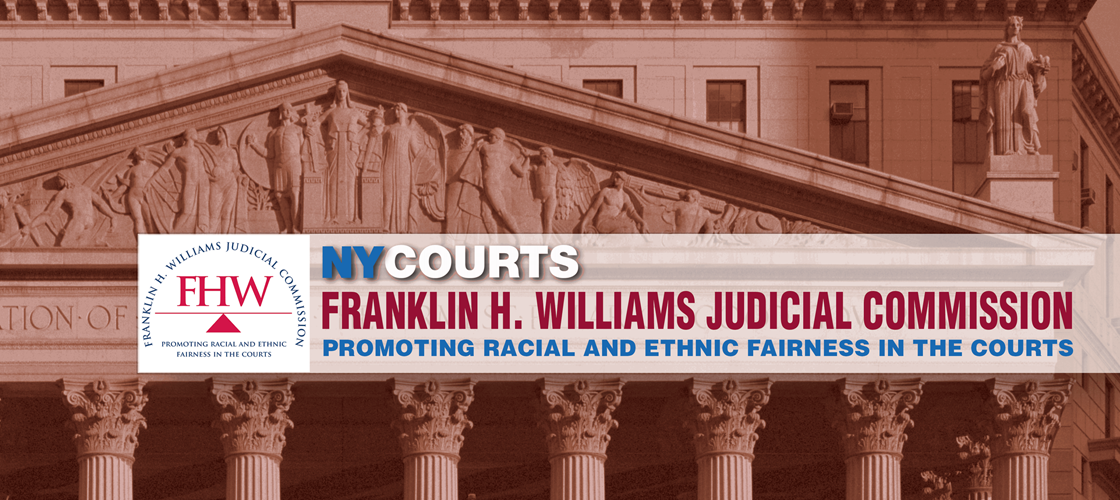 |
||
|
||
|
Please visit the Commission’s website to review a podcast interview with Commission Chair Hon. Richard B. Lowe III and a podcast of Professor Rachel Godsil from Seton Hall University comments on implicit bias from the Commission’s past conference, “Uniting Communities, Justice for all.” http://www.nycourts.gov/ip/ethnic-fairness/podcasts.shtml Follow us on Twitter @NYCourtsFHW |
|||
 |